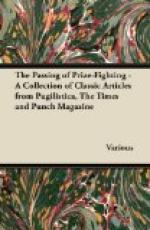Will. Which he, Sir?
Touch. He, Sir, that must marry the woman. Therefore, you Tory, abandon—which is, in the vulgar, leave—the society, which in the boorish is, company—of this female,—which in the common is, woman; which together is, abandon the society of this female, or Tory, thou vanishest; or, to thy better understanding, skedaddlest; or, to wit, I defeat thee, make thee away, translate thy majority into minority, thine Office into Opposition; I will deal in programmes with thee, or in eloquence, or in epigram; I will bandy with thee in faction; I will o’errun thee with policy; I will “mend thee or end thee” a hundred and fifty ways; therefore, tremble, and depart!
SONG (behind).
It was a lover and his lass,
With a hey, and a ho, and
a hey nonino,
That o’er the stubble fields did
pass
(Together WILL caught ’em).
In the time of autumn,
When M.P.’s spout, and “manoeuvre”
about;
M.P.’s (who are “out”)
love autumn.
About three acres and a cow,
With a hey, and a ho, and
a hey nonino;
The artful country folks know now.
In the time of autumn, &c.
Since that the franchise was their dower,
With a hey, and a ho, and
a hey nonino,
The Country Voters are a power.
In the time of autumn, &c.
And, therefore, at the present time,
With “an Agricultural
Policy”—funny, ho!—
Both Parties simple HODGE would
lime,
In the time of autumn, &c.
Will. (aside). Truly, though there is no great matter in the ditty, yet the note is very untuneable. [Exit.
Touch. Trip, AUDREY, trip, AUDREY,—I
attend,—I attend!
[Exeunt.
Jaq. (appearing). There is surely another political deluge forward, and these motley would-be couples are seeking the official ark! [Exit.
* * * * *
[Illustration: William.... SIR M-CH-L H-CKS-B-CH. Touchstone.... J-HN M-RL-Y. Audrey....THE AGRICULTURAL VOTE.
“AS HE’D LIKE IT.”
SCENE—The Forest of Ha(w)arden.
TOUCHSTONE. “I AM HE THAT MUST MARRY THIS
WOMAN! THEREFORE, YOU CLOWN,
ABANDON THE SOCIETY OF THIS FEMALE;.... I WILL
BANDY WITH THEE IN FACTION;
I WILL O’ERRUN THEE WITH POLICY; THEREFORE.
TREMBLE, AND DEPART!”—As You
Like It, Act V., Scene 1.]
* * * * *
THE TRUE TENNYSON.
We have all been startled to find from the researches of Mr. WOODALL in Notes and Queries, that “Between the story sung by the Poet Laureate in his romantic poem The Lord of Burleigh, and the actual fact, there seems to be little in common.” HENRY CECIL, Earl and afterwards Marquis of EXETER, married Miss SARAH HOGGINS under the name of JOHN JONES, having a wife alive at the time, and she did not die as the poem relates. It is obvious then that TENNYSON must be re-written, and we offer his Lordship the following humble suggestions. The Lord of Burleigh should henceforward run somewhat as follows:—




